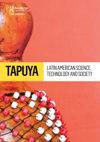从歌伦波人到地面互联网:猴面包树从殖民到数字资本主义的跨大西洋进化
IF 1.2
Q2 HISTORY & PHILOSOPHY OF SCIENCE
Tapuya: Latin American Science, Technology and Society
Pub Date : 2022-05-12
DOI:10.1080/25729861.2022.2037818
引用次数: 2
摘要
本文基于民族志的田野调查,考察了“Baobáxia”的起源和发展,这是一个分享社区生产内容的数字网络。猴面包树在21世纪初出现在巴西的“歌伦波斯”(逃亡奴隶后代的社区),并扩展到南美、非洲和欧洲的其他边缘群体。我们关注猴面包树在这个网络中的重要作用,提出了物质资源维持互联网和数字资本主义的问题。Baobaxia被证明是一个“地面互联网”,它揭露了资本主义的非物质化幻想,并在当今全球环境危机中展示了一种不同的技术发展方式。分析显示,在baobxia的建设中,祖先知识和新技术的结合,是一个适应当地地理、生态和基础设施条件的网络,支持社区抵抗、自治和可持续性。baobxia的发展,根植于历史,面向未来,是一个具有启发性的基层实验,探索和分享创造一个可能维持生命的世界的方式。我们对猴面包树五世纪跨大西洋进化的研究挑战了民族志研究中通常有限的时空框架。因此,我们呼吁在方法论上对民族志对话者的不同观点持开放态度,以指导对世界的学术理解。本文章由计算机程序翻译,如有差异,请以英文原文为准。
A terrestrial Internet from the quilombos: the transatlantic evolution of baobab from colonial to digital capitalism
ABSTRACT Based on ethnographic fieldwork, this article examines the origin and development of “Baobáxia,” a digital network for sharing community-produced content. Baobaxia emerged in “quilombos” (communities of run-away slaves’ descendents) in Brazil in the early 2000s and expanded to other marginalized groups in South America, Africa, and Europe. Our focus on the essential roles of baobab trees in this network raises the question of material resources sustaining the Internet and digital capitalism. Baobaxia turns out to be a “terrestrial Internet” that exposes the capitalist illusion of dematerialization and demonstrates a different approach to technology development amid the planetary environmental crises today. The analysis reveals the articulation of ancestral knowledge and new technologies in the building of Baobaxia, a network that is adaptive to local-geographical, ecological and infrastructural conditions and that supports community resistance, autonomy, and sustainability. The development of Baobaxia, historically rooted and future-oriented, is an enlightening grassroots experiment in exploring and sharing ways of making a world that may sustain life. Our study of the five-century transatlantic evolution of baobab challenges the often limited spatio-temporal framework in ethnographic research. We thus call for methodological openness to alternative perspectives from ethnographic interlocutors to guide academic understandings of the world.
求助全文
通过发布文献求助,成功后即可免费获取论文全文。
去求助
来源期刊

Tapuya: Latin American Science, Technology and Society
Social Sciences-Social Sciences (all)
CiteScore
1.60
自引率
0.00%
发文量
39
审稿时长
19 weeks
 求助内容:
求助内容: 应助结果提醒方式:
应助结果提醒方式:


